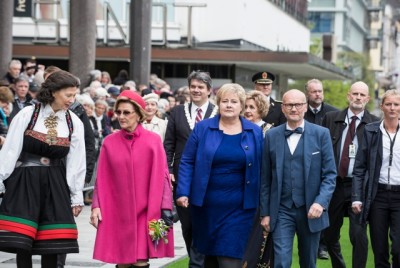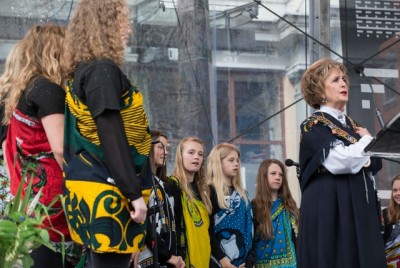When the annual Bergen International Festival opened for the 63rd time last week, there was little doubt that the proud city on Norway’s west coast was sorely in need of a party. Bergen has had a bad year, for all kinds of reasons. Between now and June 10, the festival may boost spirits and live up to this year’s opening message of love.

“The festival is a declaration of love for the city and for the world,” said former bishop Gunnar Stålsett, curiously of Oslo instead of Bergen, in his opening remarks. In the audience of around 3,000 who braved the rain that has poured down on the city for months were the prime minister and hometown heroine, Erna Solberg, and Queen Sonja. King Harald, though, wasn’t there this year like he usually is. The festival collided with an official trip to the US that palace officials had arranged, preventing his annual appearance.
Festival organizers could be glad at least the queen showed up, after a year that’s been full of trouble and disappointment. In the past year, the city has endured one downturn after another:
*** Its beloved local football club Brann fell out of Norway’s top league, leading to a scandalous annual meeting this spring that ended with its chairman and half its elections committee resigning on the spot. Last week the football club’s head coach was sacked.
*** The Bergen police were harshly criticized nationwide after it became clear that they’d badly botched the investigation of a little girl’s death, wrongly ruling it a suicide instead of murder. The police chief ended up stepping aside but criticism has continued that consequences of the police ineptitude haven’t been greater.
*** In March, the husband of high-profile Bergen Mayor Trude Drevland was convicted and sentenced to prison for embezzlement. Odd A Drevland, a former lawyer, was declared guilty of embezzling funds from a local taxi company, the estate of a deceased person and a real estate company. He accepted his punishment on the spot.
*** Alarms also rang in the city this spring when a returning resident was believed infected with the deadly ebola virus. A journalist for newspaper Dagens Næringsliv (DN), who had just arrived in the city to chronicle its many recent problems, wrote that ebola seemed like the only thing lacking after such a run of trouble. It was in Bergen, by the way, that the plague first broke out in Norway back in 1349, eerily enough exactly 666 years ago.

As if all that wasn’t enough, Bergen’s famous rain has fallen in buckets so far this year, setting new records. And in just the past few weeks, two major fires have broken out in the city’s historic districts full of wooden buildings along narrow streets. Fortunately, the local fire department did a much better job fighting the blazes than the city’s police did in a murder case, and managed to prevent both fires from spreading.
Folks in Bergen, who often refer to themselves as Bergenese instead of mere Norwegians, seem to either be taking all the setbacks in stride, or simply taking off. “It was a tough autumn and winter, but spring normally does something with folks’ self-confidence,” Kees Ekeli, the former director of Bergen’s aquarium, told DN earlier this spring. “I think that from here on, things can only improve.” Ekeli himself, however, was leaving town after quitting his job because of a conflict with aquarium employees.
‘Thick-skinned’
Herman Friele, a former mayor of Bergen and local patriot, told DN that the Bergenese are “thick-skinned” and unlikely to be defeated by the downturn. Professor Frank Aarebrot of the University of Bergen, who grew up near football club Brann’s stadium, likened the drama around Brann to a circus and indicated the club and its supporters could only blame themselves for the bad fortune.
Amidst all this, the organizers of this year’s Bergen International Festival kept smiling through the rain and the king’s absence and the turbulence around the city’s mayor as they launched into two weeks of concerts, dance and other performances that were to include 11 world premieres and 13 premieres of new works of music. Events were being held at 20 different venues in and around Bergen, including, as usual, the historic homes of Norwegian composer Edvard Grieg and violinist Ole Bull.
The classical music program included such artists as opera singer Anne Sofie von Otter, the Borodin Quartet and highly acclaimed Norwegian pianist Lief Ove Andsnes. Dance troupes were coming from as far away as Paraguay and islands in the Pacific.
Prime Minister Solberg claimed the festival in her hometown creates new perspectives on society’s challenges through art and public debates. This year, it also may simply restore pride after so many challenges in Bergen itself.
newsinenglish.no/Nina Berglund

